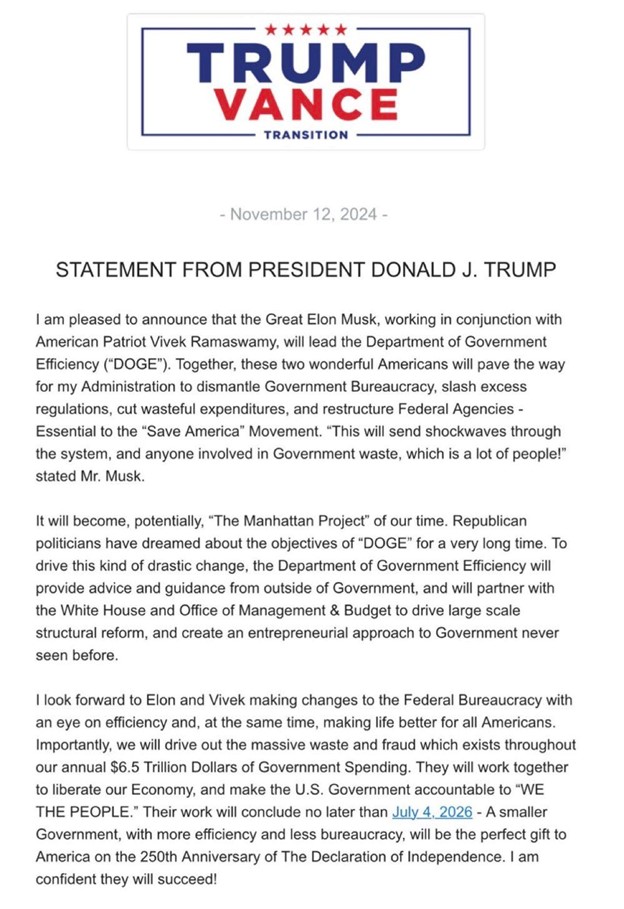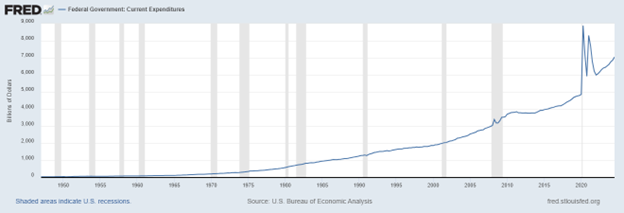Elon Musk has been appointed by the incoming President of the U.S. to head the Department of Government Efficiency, or DOGE, with a mandate to cut costs, reduce regulations, shrink the size of the bureaucracy and make government more efficient.
In the announcement Trump called him the “Great Elon Musk”.
Will the Great Elon Musk fix the government?
In September 2016 I was talking to an elderly widow from Manhattan over dinner in Scotland. She let us know that she lived in a penthouse on 5th avenue overlooking Central Park. I asked her about Trump’s chances against Clinton. She launched a passionate statement of support for Trump, opining that he would “fix health care”. She said, “he’ll apply his expertise in the private sector to the mess in healthcare.” We argued, as I had watched Trump ventures go bankrupt several times during my long career in the stock market.
During his first term Donald Trump repeatedly promised to repeal the Affordable Care Act, better known as Obamacare. Trump never delivered a plan to repeal it or to make any modification, because the Republicans in Congress know that the public likes the ACA, and they blocked any substantial changes.
Now that Trump is back in power, with fewer constraints on him, he is promising to make even more radical changes and has tapped wealthy businessman Elon Musk to make it happen.

Source: Trump Vance Transition Team
Government spending has been growing quickly.

Source: FRED - St. Louis Fed
The Federal Bureaucracy has about 3 million people. Let’s assume that all government employees could be fired without causing serious damage.
A Google search provides a credible source saying the average government salary is $71,003 in 2024. Let’s round up to $100,000 to make the math easy.
So, the bureaucracy costs $300 billion. Annual savings would be $300 billion, if none of them were rehired.
Total annual government spending is $6.75 trillion. So, annual savings from cutting all employees would be less than 5 percent of total costs, or perhaps 10 percent if outside contractors are included.
Musk has mentioned tackling the $1.8 trillion deficit so he will have to look for other sectors to cut if he is serious about eliminating the deficit.
The biggest is Health and Human Services at $1.8 trillion, which includes Medicare and Medicaid. Many elderly voters rely on these services.
Social Security is next at $1.4 trillion. But millions of Americans rely on Social Security, which they paid into all of their working lives, for their retirement.
Defense costs $1 trillion and most Americans like the protection.
Any cuts to Social Security or Health would require legislation, which must be passed by politicians who stand for election in November 2026. If they cut Social Security, they will be replaced.
So, Musk is about to find out that “sending shockwaves through the system” will have consequences at the next election. It is not like firing people in a corporation that he controls.
The Great Elon Musk may have bitten off more than he can chew.
Hilliard MacBeth
The opinions expressed in this report are the opinions of the author and readers should not assume they reflect the opinions or recommendations of Richardson Wealth or its affiliates. Assumptions, opinions and estimates constitute the author's judgment as of the date of this material and are subject to change without notice. We do not warrant the completeness or accuracy of this material, and it should not be relied upon as such. Before acting on any recommendation, you should consider whether it is suitable for your particular circumstances and, if necessary, seek professional advice. Past performance is not indicative of future results. The comments contained herein are general in nature and are not intended to be, nor should be construed to be, legal or tax advice to any particular individual. Accordingly, individuals should consult their own legal or tax advisors for advice with respect to the tax consequences to them, having regard to their own particular circumstances.. Richardson Wealth is a member of Canadian Investor Protection Fund. Richardson Wealth is a trademark by its respective owners used under license by Richardson Wealth.